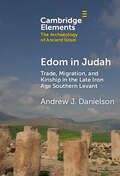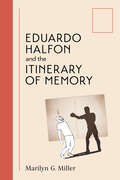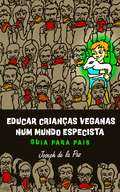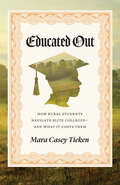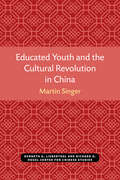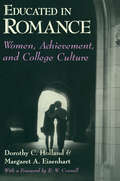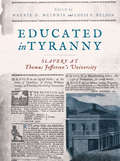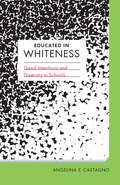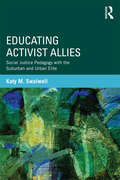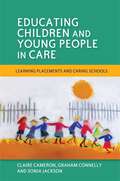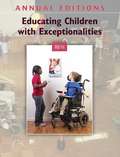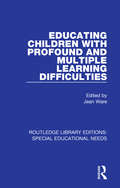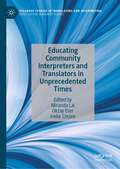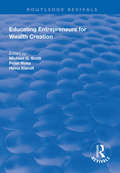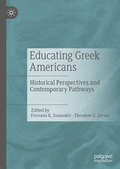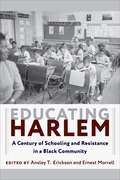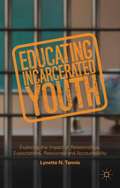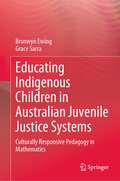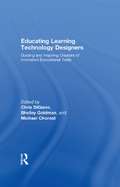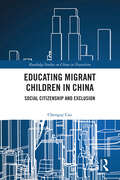- Table View
- List View
Editing the Image
by Catherine M. Soussloff Mark Cheetham Elizabeth LeggeThe editing process is a vital part of virtually every form of media. Primarily associated with texts and written language, editing is equally essential, if less examined, in regard to visual media. Editing the Image looks at the editing of visual media as both a series of technical exercises and as an allegory. It touches on concerns that are crucial to the history of art and visual culture, as well as those media and institutions that produce and disseminate the visual arts in our society.Featuring contributors from a wide range of disciplines, Editing the Image considers editing in the context of academic journals, art-historical texts, illustrated books, museum displays, and exhibitions. It is an inclusive analysis of visual forms commonly associated with the process of editing - photography, film, and video - as well as some that are not intrinsically linked to editing - painting, sculpture, and architecture. In addition to wide-ranging academic considerations, this collection includes discussions of moving picture media and studio art by practitioners, giving the study a practical focus. For anyone who has considered the implications of the editorial process, this work will be of significant interest.
Editors, Scholars, and the Social Text
by Darcy CullenAn academic book is much more than paper and ink, pixels and electrons. A dynamic social network of authors, editors, typesetters, proofreaders, indexers, printers, and marketers must work together to turn a manuscript into a book.Editors, Scholars, and the Social Text explores the theories and practices of editing, the processes of production and reproduction, and the relationships between authors and texts, as well as manuscripts and books. By bringing together academic experts and experienced practitioners, including editorial specialists, scholarly publishing professionals, and designers, Editors, Scholars, and the Social Text offers indispensable insight into the past and future of academic communication.
Edna Ferber's Hollywood: American Fictions of Gender, Race, and History (Texas Film and Media Studies Series)
by J. E. SmythEdna Ferber’s Hollywood reveals one of the most influential artistic relationships of the twentieth century—the four-decade partnership between historical novelist Edna Ferber and the Hollywood studios. Ferber was one of America’s most controversial popular historians, a writer whose uniquely feminist, multiracial view of the national past deliberately clashed with traditional narratives of white masculine power. Hollywood paid premium sums to adapt her novels, creating some of the most memorable films of the studio era—among them Show Boat, Cimarron, and Giant. Her historical fiction resonated with Hollywood’s interest in prestigious historical filmmaking aimed principally, but not exclusively, at female audiences. In Edna Ferber’s Hollywood, J. E. Smyth explores the research, writing, marketing, reception, and production histories of Hollywood’s Ferber franchise. Smyth tracks Ferber’s working relationships with Samuel Goldwyn, Leland Hayward, George Stevens, and James Dean; her landmark contract negotiations with Warner Bros.; and the controversies surrounding Giant’s critique of Jim-Crow Texas. But Edna Ferber’s Hollywood is also the study of the historical vision of an American outsider—a woman, a Jew, a novelist with few literary pretensions, an unashamed middlebrow who challenged the prescribed boundaries among gender, race, history, and fiction. In a masterful film and literary history, Smyth explores how Ferber’s work helped shape Hollywood’s attitude toward the American past.
Edna Ferber's Hollywood: American Fictions of Gender, Race, and History (Texas Film and Media Studies Series)
by J. E. SmythEdna Ferber’s Hollywood reveals one of the most influential artistic relationships of the twentieth century—the four-decade partnership between historical novelist Edna Ferber and the Hollywood studios. Ferber was one of America’s most controversial popular historians, a writer whose uniquely feminist, multiracial view of the national past deliberately clashed with traditional narratives of white masculine power. Hollywood paid premium sums to adapt her novels, creating some of the most memorable films of the studio era—among them Show Boat, Cimarron, and Giant. Her historical fiction resonated with Hollywood’s interest in prestigious historical filmmaking aimed principally, but not exclusively, at female audiences. In Edna Ferber’s Hollywood, J. E. Smyth explores the research, writing, marketing, reception, and production histories of Hollywood’s Ferber franchise. Smyth tracks Ferber’s working relationships with Samuel Goldwyn, Leland Hayward, George Stevens, and James Dean; her landmark contract negotiations with Warner Bros.; and the controversies surrounding Giant’s critique of Jim-Crow Texas. But Edna Ferber’s Hollywood is also the study of the historical vision of an American outsider—a woman, a Jew, a novelist with few literary pretensions, an unashamed middlebrow who challenged the prescribed boundaries among gender, race, history, and fiction. In a masterful film and literary history, Smyth explores how Ferber’s work helped shape Hollywood’s attitude toward the American past.
Edom in Judah: Trade, Migration, and Kinship in the Late Iron Age Southern Levant (Elements in The Archaeology of Ancient Israel)
by Andrew J. DanielsonDuring the late Iron Age (800–539 BCE) in the semi-arid southern Levant, small competing kingdoms navigated a tenuous position between their local populace and the external empires who dominated the region. For kingdoms such as Judah and Edom, this period was also one of opportunity due to their location at the intersection of lucrative trade networks connecting the Mediterranean and Arabian worlds. Such economic opportunity, together with subsistence practices rooted in mobility, resulted in a diverse and contested social landscape in the northeastern Negev borderland region between these two kingdoms. This Element explores the multifaceted interactions in this landscape. Insightful case studies highlight patterns of cross-cultural interaction and identity negotiation through the lenses of culinary practices, religion, language, and text. Ultimately, this analysis explores the lived realities of the region's inhabitants, migrants, and traders over multiple generations, emphasizing social diversity and entanglement as an integral feature of the region.
Eduardo Halfon and the Itinerary of Memory
by Marilyn G. MillerArguably, all of Guatemalan writer Eduardo Halfon&’s fictional works deal with quandaries of translation, even in their original versions. The award-winning author of fifteen books claims to have lost his mother tongue when his family fled to the United States after his tenth birthday. This displacement, echoing the displacement of his four grandparents from different corners of the Jewish diaspora to Guatemala, gives Halfon, like his ancestors before him, good reason to consider translation a natural environment for his creative work and for life itself. Indeed, Halfon&’s uncanny ability to translate his family&’s history into &“fictions&” that resonate across the globe with readers in Spanish, English, and several other languages helps explain why he has received numerous prizes in the United States, Spain, Guatemala, and even France, some as a Latin American author, others as a Latino or Jewish author. Marilyn G. Miller has written the first study to focus exclusively on this important voice in Jewish–Latin American letters. Only after returning to Guatemala and regaining his command of Spanish through reading literature did Halfon begin to build his life as a writer and translator. Nonetheless, the author admits that &“one thing is stubbornly true, and it&’s this: every sentence that I write, every verb or adjective that I painstakingly insert or remove, every literary thought that I have while writing, always . . . begins and ends in English.&” Halfon&’s translated works are never parallel texts, however. Thus, translation and its side effects (foreign words, linguistic lacunae, multilingual modes of perception) offer us crucial keys to understanding the author&’s fictional world as a vehicle for retelling and surviving Jewish trauma and finding his own particular plurilingual voice.
Educar contra el machismo
by Aurélia BlancEl primer libro de educación no sexista para niños. Un libro que lleva el feminismo a la vida familiar. Durante décadas, hemos reflexionado sobre el significado de la feminidad, sobre la educación de nuestras hijas en el feminismo, a quienes queremos ver orgullosas y emancipadas: luchamos en la escuela, en la calle, en la familia, para darles las mismas oportunidades que a los niños y para combatir los clichés. Pero seguimos criando a nuestros hijos bajo el mismo molde patriarcal que antes, como si pudiéramos deconstruir el sexismo sin preguntarnos acerca de la masculinidad. A través de estudios científicos y testimonios de profesionales, Aurélia Blanc, madre joven y periodista, reúne todas las herramientas para ayudar a los padres a criar a sus hijos de una manera igualitaria en cuanto al género. Blanc describe cómo nuestros hijos, encerrados con viejos grilletes masculinos, sufren la represión de su ser, sus sentimientos y sus deseos reales. Adoptar una educación feminista es dar a nuestros hijos la oportunidad de desarrollar su singularidad y cultivar la verdadera libertad. Un libro que da las claves para crear niños felices, libres y que vivan la igualdad como el único camino y que detecta y examina las bases del «sexismo benevolente» que desafortunadamente aún vivimos, ofreciéndonos las bases para romper ciertos roles impuestos e ideas machistas conscientes e inconscientes, evitando que contaminen nuestro imaginario y el de nuestros pequeños. Un libro que educa en la igualdad, en la vida afectiva y sexual y en la lucha contra la influencia negativa de los estereotipos, que ayudará a los padres a que sus hijos cuestionen su entorno y aprendan a responder ante actitudes sexistas, aprendiendo sin tabúes en una educación que favorezca el encuentro con la otredad.Un libro fundamental para que tu hijo se respete a sí mismo y a todos los demás y para que se convierta en un hombre libre.
Educar crianças veganas num mundo especista: Guia para pais
by Joseph de la Paz Maria"Quando embala o seu bebé, tem literalmente o futuro da humanidade nas suas mãos". Criar os nossos filhos de acordo com os nossos valroes devia ser a coisa mais natural e simples do mundo. Contudo, viemos numa sociedade que vê o veganismo com suspeição e que continua imersa em mitos especistas e nutricionais fruto do passado. Por isso, nós que somos mães e pais veganos, enfrentamos uma infinidade de situações diversas que exigem que tenhamos uma preparação especial. Este livro oferece apoio teórico e prático a esses pais. Não se centra na nutrição - apenas existe um capítulo com regras e conselhos gerais a esse respeito -, mas em todos os aspetos educativos, emocionais e sociais associados a ter um filho e a educá-lo sem trair as nossas crenças. Depois de dois anos a conversar e a entrevistar centenas de mães e pais veganos de todo o mundo, a interagir com as crianças do infantário onde trabalha e a ver as suas duas filhas crescer, o autor apresenta um livro direto, cheio de informações e inspiração. Nele poderá encontrar: •como otimizar o ambiente social em que o nosso pequeno irá crescer •como transmitir uma educação humana integral, coerente com o veganismo •como incutir os valores da igualdade animal e o respeito pela vida e pela liberdade •como completar o círculo com uma correta consciencialização acerca da nutrição e do respeito pelo meio ambiente •como explicar o veganismo e o especismo a uma criança •como resolver situações do dia-a-dia na escola, no parque ou em casa dos avós •como fazer a transição para o veganismo quando os seus filhos já comeram produtos de origem animal •como enfrentar a situação se o seu parceiro não for vegan •conselhos práticos de mães, pais e filhos veganos de diversos países •recursos úteis, desde informação nutricio
Educated Out: How Rural Students Navigate Elite Colleges—And What It Costs Them
by Mara Casey TiekenThrough the stories of nine rural, first-generation students and their families, Educated Out shows how geography shapes college opportunities, from admission to postgraduation options. A former third-grade teacher in rural Tennessee, education researcher Mara Casey Tieken watched as her former students graduated high school. She was shocked at how few were heading to college—and none were going to elite four-year schools. These students were representative of a larger national phenomenon: In 2021, 31 percent of rural adults aged twenty-five and older held a postsecondary degree, compared to 45 percent of urban adults, and rural students are especially unlikely to pursue degrees from private, selective schools. Why, Tieken wondered? And what happens to the handful of rural students who do attend elite colleges, colleges that may feel worlds away from home? Tieken addresses these questions in Educated Out—a study that shows how geography shapes rural, first-generation students’ access to college, their college experiences, and their postgraduation plans and opportunities. Tieken closely follows a group of nine students for their college years and beyond at an elite New England private school that she calls Hilltop. Interviews with these students reveal the critical moments in the students’ educational careers when their rural origins mattered most: when applying to college, she shows how students are hindered by limited college counseling resources. Once on campus, they learn that many of the school’s opportunities are not available to them: they cannot access spring break trips, job networks, or low-pay-but-important internships. These students discover that home and college are very different worlds with different academic, social, and political climates—and, over time, they start to question both. As they near graduation and navigate a job market in which the highest-paying and most prestigious opportunities are located in urban centers, they begin to feel the complicated burden of their schooling: they’ve been “educated out.” Their stories show the costs of college for rural students: If they do not pursue higher education, they lose the opportunity for social mobility; if they do, they face a more permanent departure. These costs are individual, but rural families and communities also suffer—they lose young people with talent and skills. In addition to advocating for a higher education landscape that truly includes rural students, Tieken critiques a system that requires people to leave their rural homes in search of opportunities. Our current economy depends on inexpensive rural labor. Without meaningful change, some students will have to make the impossible decision to leave home—and far more will remain there, undereducated and overlooked. Both engaging and accessible, Educated Out presents important and timely questions about rurality, identity, education, and inequality.
Educated Youth and the Cultural Revolution in China (Michigan Monographs In Chinese Studies #10)
by Martin SingerThe Cultural Revolution was an emotionally charged political awakening for the educated youth of China. Called upon by aging revolutionary Mao Tse-tung to assume a “vanguard” role in his new revolution to eliminate bourgeois revisionist influence in education, politics, and the arts, and to help to establish proletarian culture, habits, and customs, in a new Chinese society, educated young Chinese generally accepted this opportunity for meaningful and dramatic involvement in Chinese affairs. It also gave them the opportunity to gain recognition as a viable and responsible part of the Chinese polity. In the end, these revolutionary youths were not successful in proving their reliability. Too “idealistic” to compromise with the bourgeois way, their sense of moral rectitude also made it impossible for them to submerge their factional differences with other revolutionary mass organizations to achieve unity and consolidate proletarian victories. Many young revolutionaries were bitterly disillusioned by their own failures and those of other segments of the Chinese population and by the assignment of recent graduates to labor in rural communes. Educated Youth and the Cultural Revolution in China reconstructs the events of the Cultural Revolution as they affected young people. Martin Singer integrates material from a range of factors and effects, including the characteristics of this generation of youths, the roles Mao called them to play, their resentment against the older generation, their membership in mass organizations, the educational system in which they were placed, and their perception that their skills were underutilized. To most educated young people in China, Singer concludes, the Cultural Revolution represented a traumatic and irreversible loss of political innocence, made yet more tragic by its allegiance to the unsuccessful campaign of an old revolutionary to preserve his legacy from the inevitable storms of history.
Educated in Romance: Women, Achievement, and College Culture
by Dorothy C. Holland Margaret A. EisenhartIs romance more important to women in college than grades are? Why do so many women enter college with strong academic backgrounds and firm career goals but leave with dramatically scaled-down ambitions? Dorothy C. Holland and Margaret A. Eisenhart expose a pervasive "culture of romance" on campus: a high-pressure peer system that propels women into a world where their attractiveness to men counts most.
Educated in Tyranny: Slavery at Thomas Jefferson’s University
by Andrew Johnston Kirt von von Daacke Louis P. Nelson Maurie D. McInnis Benjamin Ford James Zehmer Jessica E. SewellFrom the University of Virginia’s very inception, slavery was deeply woven into its fabric. Enslaved people first helped to construct and then later lived in the Academical Village; they raised and prepared food, washed clothes, cleaned privies, and chopped wood. They maintained the buildings, cleaned classrooms, and served as personal servants to faculty and students. At any given time, there were typically more than one hundred enslaved people residing alongside the students, faculty, and their families. The central paradox at the heart of UVA is also that of the nation: What does it mean to have a public university established to preserve democratic rights that is likewise founded and maintained on the stolen labor of others? In Educated in Tyranny, Maurie McInnis, Louis Nelson, and a group of contributing authors tell the largely unknown story of slavery at the University of Virginia. While UVA has long been celebrated as fulfilling Jefferson’s desire to educate citizens to lead and govern, McInnis and Nelson document the burgeoning political rift over slavery as Jefferson tried to protect southern men from anti-slavery ideas in northern institutions. In uncovering this history, Educated in Tyranny changes how we see the university during its first fifty years and understand its history hereafter.
Educated in Whiteness: Good Intentions and Diversity in Schools
by Angelina E. CastagnoEducators across the nation are engaged in well-meaning efforts to address diversity in schools given the current context of NCLB, Race to the Top, and the associated pressures of standardization and accountability. Through rich ethnographic accounts of teachers in two demographically different secondary schools in the same urban district, Angelina E. Castagno investigates how whiteness operates in ways that thwart (and sometimes co-opt) even the best intentions and common sense—thus resulting in educational policies and practices that reinforce the status quo and protect whiteness rather than working toward greater equity.Whereas most discussions of the education of diverse students focus on the students and families themselves, Educated in Whiteness highlights the structural and ideological mechanisms of whiteness. In schools, whiteness remains dominant by strengthening and justifying the status quo while simultaneously preserving a veneer of neutrality, equality, and compassion. Framed by critical race theory and whiteness studies, this book employs concepts like interest convergence, a critique of liberalism, and the possessive investment in whiteness to better understand diversity-related educational policy and practice.Although in theory most diversity-related educational policies and practices are intended to bring about greater equity, too often in practice they actually maintain, legitimate, and so perpetuate whiteness. Castagno not only sheds light on this disconnect between the promises and practices of diversity-related initiatives but also provides insight into why the disconnect persists.
Educating Activist Allies: Social Justice Pedagogy with the Suburban and Urban Elite (Critical Social Thought)
by Katy M. SwalwellA CHOICE Outstanding Academic Title 2013! Educating Activist Allies offers a fresh take on critical education studies through an analysis of social justice pedagogy in schools serving communities privileged by race and class. By documenting the practices of socially committed teachers at an urban private academy and a suburban public school, Katy Swalwell helps educators and educational theorists better understand the challenges and opportunities inherent in this work. She also examines how students responded to their teachers’ efforts in ways that both undermined and realized the goals of social justice pedagogy. This analysis serves as the foundation for the development of a curricular framework helping students to foster an "Activist Ally" identity: the skills, knowledge, and dispositions necessary to negotiate privilege in ways that promote justice. Educating Activist Allies provides a powerful introduction to the ways in which social justice curricula can and should be enacted in communities of privilege.
Educating Children and Young People in Care: Learning Placements and Caring Schools
by Claire Cameron Graham Connelly Sonia JacksonChildren and young people in care rarely match the academic achievements of their peers and policy and procedures to address this inequality have not yet remedied the problem. Drawing on ideas from social pedagogy, the authors present a new approach - learning placements and caring schools. They show that education and care must be considered integral to both out of home placements and schools. Packed with practice examples, it includes chapters on early childhood education and care, as well as alternatives to school and higher education, covering everything from birth up to the age of 25. It highlights the potential benefits of a range of learning opportunities, from drama and outdoor activities, to bedtime stories and mentoring as well as providing support for teachers in their role as carer. Chapters include key points, case studies, practice points and useful resources. This is a unique evidence-informed practical guide for students and professionals in the fields of social work, social care, psychology and education.
Educating Children with Exceptionalities 10/11 (20th edition)
by Karen L. FreibergThe Annual Editions series provides students with convenient, inexpensive access to current, carefully selected articles from the public press. Annual Editions: Educating Children with Exceptionalities 10/11 is an easy-to-use reader that presents articles on important topics such as fitting in, severe disabilities, gifted and talented, and many more.
Educating Children with Profound and Multiple Learning Difficulties (Routledge Library Editions: Special Educational Needs #60)
by Jean WareFirst published in 1994. The authors of this book aim to make recent developments in psychological research accessible to teachers of pupils with profound and multiple learning difficulties. The authors present their own and related research in the areas of assessment, curriculum, and teaching techniques, taking care to point out the range, relevance and limitations of findings in the context of pupils with PMLDs. As this is an area of acute training need, the book will meet a real need for a broad current perspective on good practice. The needs of pupils at primary and secondary levels are considered and case studies are used to exemplify some of the challenges and approaches discussed.
Educating Community Interpreters and Translators in Unprecedented Times (Palgrave Studies in Translating and Interpreting)
by Miranda Lai Oktay Eser Ineke CrezeeThis edited book features contributions from interpreter and translator educators globally, in which they discuss changes to teaching, assessment and practice as a result of the COVID-19 pandemic. The chapters provide a comprehensive picture of educators’ responses to challenges and opportunities. The book will be of interest to students, researchers and educators, as well as government language policymakers and stakeholders of translation and interpreting agencies.
Educating Entrepreneurs for Wealth Creation (Routledge Revivals)
by Peter Rosa Michael G. Scott Heinz KlandtPublished in 1998, this book moves away from the basic education of entrepreneurs to new models and methods, often running in cooperation with orthodox management courses in institutes of higher education. The papers in this book develop themes, models and concepts for the education of wealth creating entrepreneurs.
Educating Greek Americans: Historical Perspectives and Contemporary Pathways
by Theodore G. Zervas Fevronia K. SoumakisThis edited collection considers Greek American formal and informal educational efforts, institutions, and programs, broadly conceived, as they evolved over time throughout the United States. The book’s focus on Greek Americans aims to highlight the vast array of educational responses to local needs and contexts as this distinct, yet, heterogeneous immigrant community sought to maintain its linguistic, cultural, and religious heritage for over one hundred years. The chapters in this volume amend the scholarly literature that thus far has not only overlooked Greek American educational initiatives, but has also neglected to recognize and analyze the community’s persistence in sustaining them. This book is an important contribution to an understanding of Greek Americans’ long overdue history as a significant diaspora community within an American context.
Educating Harlem: A Century of Schooling and Resistance in a Black Community
by Ernest Morrell Ansley T. EricksonOver the course of the twentieth century, education was a key site for envisioning opportunities for African Americans, but the very schools they attended sometimes acted as obstacles to black flourishing. Educating Harlem brings together a multidisciplinary group of scholars to provide a broad consideration of the history of schooling in perhaps the nation’s most iconic black community.The volume traces the varied ways that Harlem residents defined and pursued educational justice for their children and community despite consistent neglect and structural oppression. Contributors investigate the individuals, organizations, and initiatives that fostered educational visions, underscoring their breadth, variety, and persistence. Their essays span the century, from the Great Migration and the Harlem Renaissance through the 1970s fiscal crisis and up to the present. They tell the stories of Harlem residents from a wide variety of social positions and life experiences, from young children to expert researchers to neighborhood mothers and ambitious institution builders who imagined a dynamic array of possibilities from modest improvements to radical reshaping of their schools. Representing many disciplinary perspectives, the chapters examine a range of topics including architecture, literature, film, youth and adult organizing, employment, and city politics. Challenging the conventional rise-and-fall narratives found in many urban histories, the book tells a story of persistent struggle in each phase of the twentieth century. Educating Harlem paints a nuanced portrait of education in a storied community and brings much-needed historical context to one of the most embattled educational spaces today.
Educating Incarcerated Youth
by Lynette N. TannisThis book explores the perceptions and role of juvenile justice educators. Through researching the support structures of educational facilities and analysing the positive features of these learning environments, Tannis evaluates how best to educate incarcerated young people and prepare them for their transition back into society.
Educating Indigenous Children in Australian Juvenile Justice Systems: Culturally Responsive Pedagogy in Mathematics
by Bronwyn Ewing Grace SarraThis book addresses key issues in the context of the national policy of educating children accused of crimes in Juvenile Courts in Australia. For several decades, National and State Governments in Australia have struggled to define education, constantly seeking to improve the way society applies the concept. This book presents an accurate portrayal of consequences of the education policy of trying to educate troubled children and young people in trouble with the law. It describes the work of juvenile detention centre mathematics teachers and their teaching contexts. It portrays teachers as learners, who ventured with researchers with a theoretical perspective. This book focuses on culturally responsive pedagogies that seek to understand the ways Indigenous children and young people in juvenile detention make sense of their mathematical learning, which, until the time of detention, has been plagued by failure. It examines how the underperformance of Aboriginal and Torres Strait Islander students, and students from low socioeconomic backgrounds are strong determinants of their overrepresentation in the juvenile justice system in Australia. This book presents the argument that if the students’ literacy and numeracy levels can be improved, there is opportunity to build better futures away from involvement in the juvenile justice system and towards productive employment to improve life chances.
Educating Learning Technology Designers: Guiding and Inspiring Creators of Innovative Educational Tools
by Michael Chorost Shelley Goldman Chris DiGianoWhat knowledge and skills do designers of learning technologies need? What is the best way to train them to create high-quality educational technologies? Distilling the wisdom of expert instructors and designers, this cutting-edge guide offers a clear, accessible balance of theory and practical examples. This cutting-edge guide: synthesizes learning, instructional design, and educational technology perspectives on learning-centered technology — highlighting how interdisciplinary work is driving the fields of the learning sciences and technology design and development offers helpful resources for both faculty and students — including descriptions of a variety of successful courses in learning technology design, examples of student work with commentary by instructors and students, and discussions of "lessons learned" in course development includes a "To the Student" chapter that speaks in plain language about what is exciting and challenging about creating technology for kids Directed to university instructors working with students on developing educational software projects and to managers leading learning technologies development teams, this book is a valuable resource for guiding and inspiring the next generation of designers of learning technologies.
Educating Migrant Children in China: Social Citizenship and Exclusion (Routledge Studies on China in Transition)
by Chengqi CaoThis book explores social citizenship through the lens of investigating local compulsory education policy targeting migrant children in Beijing and Guangzhou.Deploying a multi-case methodology, this book illustrates how these two local governments respond to central decisions on compulsory education for migrant children, the implementation models they employ and the impact of this unique practice on social citizenship boundary redefinition through single- and cross-case analysis. It helps readers understand the evolution of compulsory education policy and its effects on access to schooling for migrant children and clearly illustrates this policy’s implications for social citizenship.Revealing the important relationship between the central and lower levels of government in China, this book will appeal to students and scholars of education, social policy, as well as those with an interest in Chinese culture and society.


